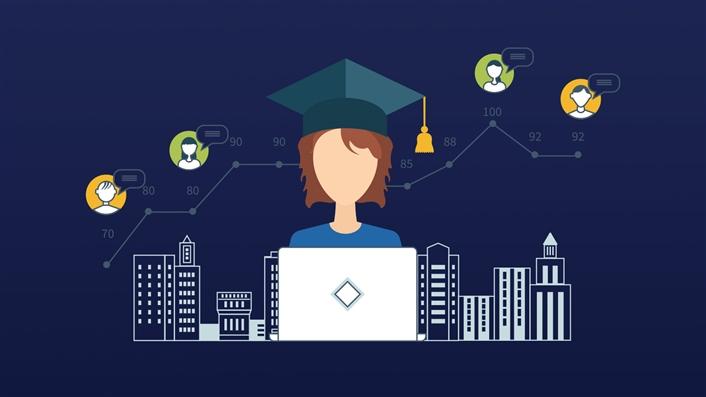Today, faculty members from a variety of disciplines along with advisors and technologists analyze learning data to better understand why students struggle at particular stages of their academic careers and how they can immediately, or even preemptively, address such issues.

Determining how institutions can best support students on the road to graduation has long been a focus in higher education, whether analyzed by persistence toward graduation or other measures of academic success. Thanks to the advent of big data, the opportunity to study such metrics—both in real time and those incorporating predictive models—has perhaps never been more accessible. Today, faculty members from a variety of disciplines along with advisors and technologists analyze learning data to better understand why students struggle at particular stages of their academic careers and how they can immediately, or even preemptively, address such issues.
Released in August, the 2018 NMC Horizon Report shared the latest developments on the accelerating trend of learning analytics technologies, which enable the proactive collection, connection, combination, and interpretation of data to more clearly understand evolving learner capabilities. Having this knowledge can help institutions provide more personalized and adaptive learning experiences as well.
Many colleges and universities are exploring a variety of uses for and applications of learning analytics. Three institutional projects illustrate the value of analytics across several contexts.
Learning Analytics Fellows Program, Indiana University at Bloomington
If you want to discover the most optimal ways to use learning analytics, why not establish your own on-campus brain trust? At IUB's Center for Learning Analytics and Student Success (CLASS), they've done just that. CLASS connects a campus-wide community of faculty who are engaged in research projects around understanding the institution's current collection of data and suggesting new sources or models of data, along with ways to conduct research on student learning.
IUB defines learning analytics as "the study of students as learners through a process of systematic collection, exploration, and analysis of data describing students, their observable activities, and outcomes." The strategic planning process for IUB identified an objective to empower its faculty with learning analytics and predictive models, which would enable them to investigate student success at the course, program, and institutional levels.
Facilitated by CLASS, the Learning Analytics Fellows Program ensures that faculty members of many disciplines can contribute their perspectives to how learning analytics will be shaped and used in the future at Indiana University. The program supports faculty-driven research projects that incorporate the use of learning analytics to better understand and improve student engagement, retention, and success. As of June 2018, the program had 42 participating fellows from 22 disciplines who had employed various methods of studying student demographics, performance, and preparedness. They used this information to analyze 110,000 students' individual paths on the way to graduation. Thus far, 33 research projects have culled information from a total of 3.8 million student records.
American Women's College, Bay Path University
Just because students are undertaking courses or entire degree programs at a distance doesn't mean that they should miss out on personalized attention afforded to on-campus peers. New technologies enable more touchpoints with students, such as those at American Women's College. Set within a larger private university in Massachusetts, this institution mainly supports nontraditional female students through hybridized and online programs, which begin at six times throughout the academic year. The American Women's College is committed to using learning and engagement analytics to pursue intervention strategies focused on student success and completion. To facilitate this, the college has built a data warehouse that aggregates student data from systems related to curriculum and academic services, providing a holistic profile of each student.
As a result, administrators have been able to design automated outreach plans and set alert rules that enable advisors and faculty to provide proactive support for students. The results of such interventions are sent back to the college's data warehouse in order to capture longitudinal information about the success of outreach methods and support strategies. According to the institution, the approach has yielded rates for retention (75%), course completion (93%), and student satisfaction (95%) that are well above national averages for online, nontraditional students.
Lehman College, City University of New York
How can an in-house mobile platform improve the student learning experience? At CUNY, faculty and administrators are seeing the fruits of their investment firsthand with Lehman 360. This internally developed technology integrates student data from multiple sources and is accessible through a user-friendly mobile interface with personalization and customization features. Notifications enable students, faculty, and advisors to take action, and information is viewable in a single mobile hub.
This kind of resource helps support and encourage student success efforts at scale, as the vast majority of current college students own (and frequently check) smartphones. Since the mobile app functions as the intersection of critical information for a variety of stakeholders, CUNY's tech team built it with an adaptable, innovative architecture that enables easy updates and additions of new components through web services and various APIs.
Interested in learning more about global developments in learning analytics? Check out the latest exemplars and insights from the field in the 2018 NMC Horizon Report.
Kristi DePaul of Founders Marketing provides editorial support and regular contributions to the Transforming Higher Ed column of EDUCAUSE Review on issues of teaching, learning, and edtech.
© 2018 Kristi DePaul. The text of this work is licensed under a Creative Commons BY-NC-ND 4.0 International License.
